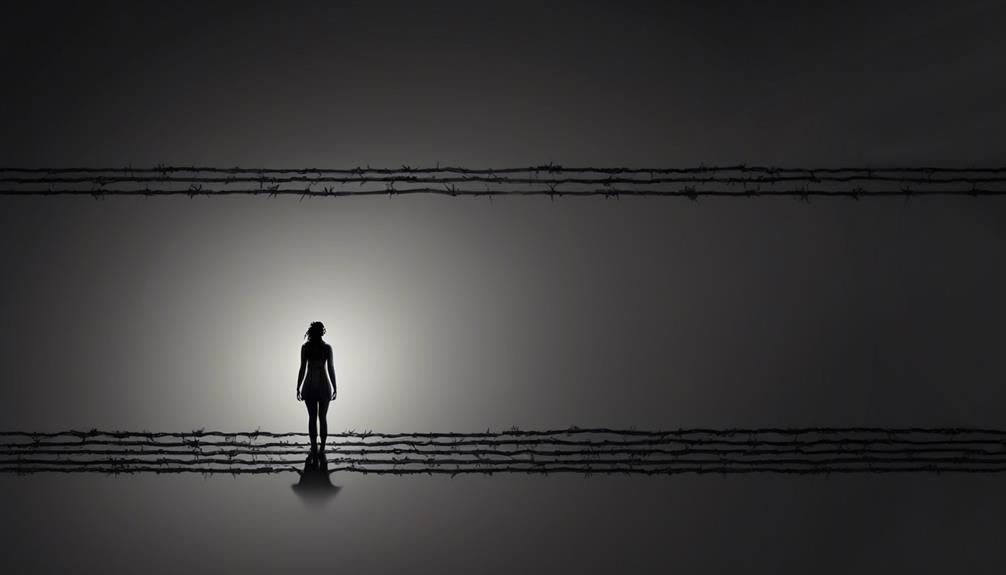Picture walking through a field that is completely made of fragile glass, where every step is taken with care and hesitation. The burden of unspoken thoughts and dreams that have not been fulfilled looms over each interaction and choice we make.
The intricate dance between a daughter and her Borderline mother is a complex tapestry of emotions and challenges, woven with threads of love, guilt, and longing for validation. These dynamics can leave us feeling adrift in a sea of conflicting emotions, seeking solid ground amidst the turbulent waves of our mother's BPD.
Key Takeaways
- Boundaries crucial for emotional well-being
- Therapy aids in coping and healing
- Support network offers validation and guidance
- Self-care and self-compassion essential for healing
Impact of BPD Mother on Daughter
Growing up with a mother who's Borderline Personality Disorder can significantly impact a daughter's emotional well-being and sense of stability. As daughters of a borderline mother, we often find ourselves grappling with a deep fear of abandonment, stemming from the volatile reactions and unpredictable behaviors we witness. This fear can lead to chronic emptiness and a pervasive sense of instability that affects our overall security.
The emotional burden placed upon daughters by their borderline mothers can be overwhelming. We may struggle with low self-esteem, trust issues, and difficulty setting boundaries in relationships. The constant turmoil within our interactions with our mothers can leave us with lasting impacts on our mental health, including anxiety and a sense of responsibility for our mother's happiness. This can result in a cycle of guilt and self-blame, making it challenging for us to form healthy relationships and trust our own judgment.
Learning to navigate these complexities while prioritizing our own well-being is crucial for our emotional growth and stability.
Challenges Faced by Daughters

Coming to terms with the challenges faced by daughters of borderline mothers requires a profound acknowledgment of the emotional complexities and lasting impacts of such relationships. Daughters of borderline mothers often grapple with a myriad of difficulties that shape their lives in profound ways:
- Boundaries: Setting and maintaining boundaries becomes a daunting task, as these daughters may not have learned healthy boundary-setting behaviors growing up.
- Guilt and Responsibility: Feeling an overwhelming sense of guilt and responsibility for their mother's happiness and well-being is a heavy burden carried by many daughters of borderline mothers.
- Trust Issues, Low Self-Esteem, and Anxiety: These daughters commonly struggle with trust issues, harbor low self-esteem, and battle anxiety due to the unpredictable nature of their mother's behavior.
- Walking on Eggshells and Lack of Assertiveness: The constant fear of triggering their mothers and the difficulty in asserting their own needs leave daughters of borderline mothers in a perpetual state of unease and self-doubt.
Navigating Complex Mother-Daughter Dynamics
Navigating the intricate dynamics between a mother and daughter, especially in cases involving borderline personality disorder, requires a delicate balance of understanding, empathy, and self-preservation. Daughters of borderline mothers often grapple with a fear of abandonment, struggle to set boundaries, and carry the heavy emotional burden of their mother's behavior. Trust issues and dysfunctional patterns further complicate these complex relationships, leading daughters to feel suffocated and overwhelmed. Seeking therapy becomes crucial to unravel these entangled mother-daughter dynamics, providing a safe space to process emotions and learn healthy coping mechanisms. Setting boundaries is not only an act of self-care but also a necessary step towards breaking free from the cycle of dysfunction. By addressing trust issues, fostering self-compassion, and prioritizing their own well-being, daughters can navigate these challenging dynamics with resilience and pave the way for healing.
| Challenges | Solutions |
|---|---|
| Fear of abandonment | Setting boundaries |
| Emotional burden | Seeking therapy |
| Trust issues | Prioritizing self-care |
| Dysfunctional patterns | Establishing trust |
Healing Journey for Daughters

Embarking on a healing journey as daughters of borderline mothers entails confronting deep-seated emotional wounds and embracing the path to self-restoration. It's a challenging road, but one that offers the promise of growth and healing.
Here are four key steps to guide daughters of borderline mothers on their journey to recovery:
- Setting Boundaries: Establishing healthy boundaries is essential for protecting your emotional well-being and maintaining self-respect. Learning to say no and prioritize your needs is a crucial step in reclaiming your autonomy.
- Seeking Therapy: Engaging in therapy, especially trauma-informed therapy, can provide a safe space to explore past experiences, process emotions, and develop coping strategies. Therapy can help you unravel the complexities of your upbringing and navigate the challenges of healing.
- Building a Support Network: Surrounding yourself with understanding and empathetic individuals can provide a sense of validation and belonging. A strong support network can offer encouragement, guidance, and a listening ear during difficult times.
- Practicing Self-Care: Cultivating self-awareness and prioritizing self-care activities is vital for nurturing your mental and emotional well-being. Taking time for yourself, engaging in activities that bring you joy, and practicing self-compassion are all essential components of your healing journey.
Coping Strategies for Daughters
Cultivating healthy coping strategies is essential for daughters of borderline mothers to navigate the challenges of their unique upbringing and prioritize their emotional well-being. When a child grows up with a mother who has Borderline Personality Disorder (BPD), the relationship dynamics can be complex and emotionally taxing. Implementing coping mechanisms is crucial for maintaining mental wellness. Here are some strategies that can help daughters in their journey:
| Coping Strategies | Description |
|---|---|
| Therapy | Seeking therapy can aid in addressing childhood trauma and developing emotional regulation. |
| Setting Boundaries | Establishing clear boundaries with the mother is vital for autonomy and self-identity. |
| Building Support Network | Creating a support system outside the family offers additional emotional validation. |
| Self-Care Practices | Engaging in mindfulness and self-compassion activities can assist in mental well-being. |
| Self-Forgiveness and Acknowledgment | Recognizing the impact of maternal BPD and working on self-forgiveness are crucial steps in the healing process. |
Frequently Asked Questions
What Happens to Children of Borderline Mothers?
When children have borderline mothers, they often face challenges like fear of abandonment, instability, and difficulties with boundaries. These struggles can lead to feelings of guilt, anxiety, and excessive responsibility for their mother's well-being.
Over time, these experiences may impact their ability to form healthy relationships, assert needs, and maintain emotional well-being. The emotional burden can have lasting effects on trust, self-esteem, and overall mental health in adulthood.
What Is the Trauma of a Borderline Mother?
The trauma of a borderline mother can be devastating. It often involves intense emotional instability, fear of abandonment, and a constant sense of emptiness. Living in such an environment can lead to long-lasting effects on the children involved.
Witnessing self-destructive behaviors and feeling suffocated by their mother's needs can create profound challenges for daughters of borderline mothers. These experiences can shape our relationships, sense of self, and ability to set boundaries.
What It's Like Having a Borderline Mother?
Having a borderline mother can be incredibly challenging. We may experience constant instability, fear of abandonment, and emotional turmoil. Walking on eggshells becomes second nature, as we try to avoid triggering her unpredictable reactions.
Setting boundaries becomes a daunting task, and we may struggle with trust, self-esteem, guilt, and anxiety. Healing involves therapy, self-care, and breaking free from harmful patterns to reclaim our well-being and sense of self.
Is BPD Inherited From Mother or Father?
When it comes to BPD inheritance, studies suggest a higher risk from a mother with BPD than from a father. Both genetic and environmental factors contribute, but maternal influence often plays a more significant role.
Understanding this complex interplay can shed light on the transmission of BPD. It's crucial to consider these dynamics when exploring the heritability of BPD and its impact on future generations.
Conclusion
In conclusion, daughters of BPD mothers face a myriad of challenges, navigating a complex emotional landscape filled with uncertainty and insecurity.
However, through therapy, setting boundaries, and building a support network, daughters can embark on a healing journey towards reclaiming their sense of self and breaking free from the weight of their mother's emotional burden.
It's a journey of resilience, growth, and self-discovery, ultimately leading to a brighter and more empowered future.









